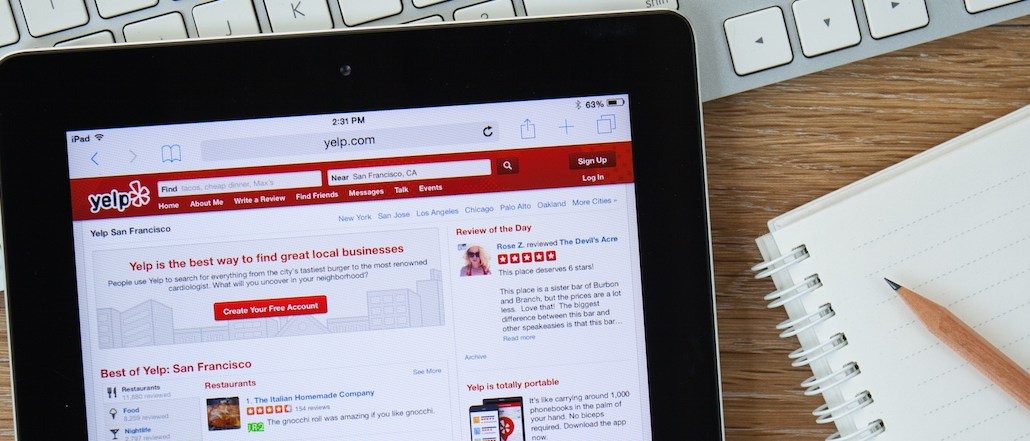Save 50% on a 3-month Digiday+ membership. Ends Dec 5.

Last week, Yelp announced it added a trove of new information to its reviews for health care facilities, which account for 6 percent of reviewed businesses on the site. To add data and nuance to the category, however, Yelp went beyond mere crowdsourced customer reviews and teamed up with a surprising new partner to make it all happen — ProPublica.
The non-profit investigative news outlet is contributing information from its own research to Yelp’s health-related reviews as well as government data from the Centers for Medicare and Medicaid Services, according to The Washington Post. Now, in addition to the standard star rating and customer-reviews, each medical business will include metrics like emergency-room wait times, noise levels in patient rooms, nursing home fines, and even dialysis clinic death rates.
The benefits of this partnership for Yelp are fairly obvious: added content to attract new users and keep visitors on its site longer, increased revenue from potential health care advertisers, and borrowed legitimacy to combat its periodic credibility issues. But ProPublica is a Pulitzer-winning news organization that prides itself on chasing stories with “moral force,” making it somewhat counterintuitive for it to team with a site still best know for restaurant reviews.
The partnership, however, can be explained in four reasons:
It serves ProPublica’s mission.
The partnership aligns with ProPublica’s greater mission to serve the public interest. It also fits with the organization’s methodology of using data and history of using partnerships (though these are usually with the likes of The New York Times or NPR). Combine the two and the collaboration makes a lot of sense, said Rick Edmonds, media business analyst at Poynter. The project provides available, but often hard to find, health care data to the public in a user-friendly and familiar interface. It places helpful information in front of people at the moment they are choosing a doctor or hospital, and “that’s where we want our data to be,” said Scott Klein, ProPublica’s assistant managing editor.
It increases brand awareness.
ProPublica is known within the journalism community for having won two Pulitzers, a Peabody and a National Magazine award all in under 10 years. But in an era when cat videos attract countless more eyeballs than, say, an detailed examination of environmental damage in Louisiana, investigative work doesn’t always equal traffic. The partnership with Yelp gets the ProPublica name out to a wider audience. ProPublica reported only 992,000 average monthly uniques to its website in its latest report to stakeholders. According to comScore, it had 289,000 total uniques during June, 37 percent of which were on mobile. In comparison, Yelp had 87.8 million uniques in June with 72 percent on mobile. While Klein said ProPublica is less concerned with traffic than with affecting change, the partnership still means a few more curious eyes could make their way to its website.
It provides useful data for stories.
The deal gives ProPublica bulk access to all of Yelp’s health care reviews. Klein said this can be used for research in future stories and to find potential sources. ProPublica can analyze the data by keyword or word pairs to find people who use a particular drug or have visited a specific hospital, then reach out to them through Yelp to ask if they would be interested in talking to a journalist. While this could trigger privacy concerns, ProPublica made clear that it will only receive user and review info available publicly on Yelp’s site. The news outlet currently has three reporters who focus entirely on health care, but because investigations are not limited by beat, they often have other journalists working with health care information as well. This data could prove unbelievably helpful to their overall work.
Ad position: web_incontent_pos1
It could increase revenue.
Yelp didn’t pay for any of the data provided by ProPublica, but the deal sets up the publisher for increased revenue streams in the future. ProPublica is funded principally by donors like The Ford Foundation and Sandler Foundation, and while the partnership didn’t bring in any cash, it could potentially attract donors who are interested in health care and informed health consumers, said Edmonds. ProPublica also sells some of its data sets, and if this experiment proves successful, other commercials sites could reach out with an interest in buying data that could improve their product.
As odd as the partnership initially seems, it has the potential to provide value to both Yelp and ProPublica, as well as the customers that use it. ProPublica has always balanced the dual objectives of fulfilling its mission and building its brand, said Edmonds. Here it’s doing both.
More in Media

What publishers are wishing for this holiday season: End AI scraping and determine AI-powered audience value
Publishers want a fair, structured, regulated AI environment and they also want to define what the next decade of audience metrics looks like.

Digiday+ Research Subscription Index 2025: Subscription strategies from Bloomberg, The New York Times, Vox and others
Digiday’s third annual Subscription Index examines and measures publishers’ subscription strategies to identify common approaches and key tactics among Bloomberg, The New York Times, Vox and others.

From lawsuits to lobbying: How publishers are fighting AI
We may be closing out 2025, but publishers aren’t retreating from the battle of AI search — some are escalating it, and they expect the fight to stretch deep into 2026.
Ad position: web_bfu